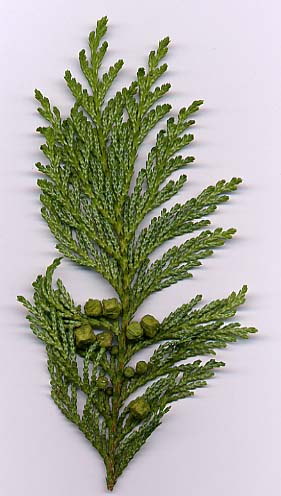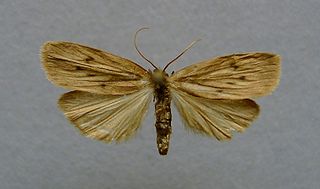
Chamaecyparis, common names cypress or false cypress, is a genus of conifers in the cypress family Cupressaceae, native to eastern Asia and to the western and eastern margins of the United States. The name is derived from the Greek khamai (χαμαί), meaning "on the earth", and kuparissos (κυπάρισσος) for "cypress".

Chamaecyparis obtusa is a species of cypress native to central Japan in East Asia, and widely cultivated in the temperate northern hemisphere for its high-quality timber and ornamental qualities, with many cultivars commercially available.

The broad-tailed paradise whydah is a species of bird in the family Viduidae. It is found in woodland and acacia savanna habitat in Sub-Saharan Africa from Angola to Uganda, Tanzania and Mozambique. A brood parasite, it has a wide range and the International Union for Conservation of Nature has assessed it as being of least concern.

Plumeria obtusa, the Singapore graveyard flower, is a species of the genus Plumeria (Apocynaceae). It is native to the Neotropics, but widely cultivated for its ornamental and fragrant flowers around the world, where suitably warm climate exists.

Azenia obtusa, the obtuse yellow moth, is a moth of the family Noctuidae. The species was first described by Gottlieb August Wilhelm Herrich-Schäffer in 1854. It is found in North America from southern Ontario and New York to Florida and west to Texas and Missouri.

Pelosia obtusa, the small dotted footman, is a moth of the family Erebidae. The species was first described by Gottlieb August Wilhelm Herrich-Schäffer in 1847. It is found from central Europe through Asia to the Pacific Ocean.
Leucophora johnsoni is a species of root-maggot flies in the family Anthomyiidae.

Leucophora is a genus of root-maggot flies in the family Anthomyiidae. There are at least 60 described species in Leucophora.
Leucophora apivora is a species of root-maggot fly in the family Anthomyiidae.
Diplocheila obtusa is a species of ground beetle in the family Carabidae. It is found in North America.
Muda is a genus of cicadas in the family Cicadidae. There are at least four described species in Muda.
Leucophora unilineata is a species of root-maggot flies in the family Anthomyiidae.
Leucophora marylandica is a species of root-maggot flies in the family Anthomyiidae.

Clastoptera obtusa, the alder spittlebug, is a species of spittlebug in the family Clastopteridae. It is found in North America.

Marpissa obtusa is a species of jumping spider. It is found in the United States.
Chionea obtusa is a species of limoniid crane fly in the family Limoniidae.
Pelmatellus obtusa is a species of ground beetle in the family Carabidae.
Oligia obtusa is a species of cutworm or dart moth in the family Noctuidae.
Acmaeodera obtusa is a species of metallic wood-boring beetle in the family Buprestidae. It is found in North America.

Eulophia obtusa, a showy and distinctive species of orchid, popularly known as the ground orchid, recorded from Bangladesh, North India and Nepal. This orchid growing in seasonally in grassland. It is a grass associated orchid species. A Bangladesh based renowned botanist and ornithologist Md Sharif Hossain Sourav first described this rare species from Bangladesh in 2017. There are only three collections in the Kew Herbarium dates from 1902, which suggests that it is quite a rare species. It is assessed as critically endangered (CR) in Bangladesh according to the IUCN Red Listing criteria. Very recently this species was rediscovered in India after 118 years.










